|
|
|
Sort Order |
|
|
|
Items / Page
|
|
|
|
|
|
|
| Srl | Item |
| 1 |
ID:
106000


|
|
|
|
|
| Publication |
2011.
|
| Summary/Abstract |
This paper seeks to explore how a particular narrative focused on population-centric counterinsurgency shaped American strategy during the Autumn 2009 Presidential review on Afghanistan, examine the narrative's genealogy and suggest weaknesses and inconsistencies that exist within it. More precisely our ambition is to show how through a process of 'rhetorical re-description' this narrative has come to dominate contemporary American strategic discourse. We argue that in order to promote and legitimate their case, a contemporary 'COIN Lobby' of influential warrior scholars, academics and commentators utilizes select historical interpretations of counterinsurgency and limits discussion of COIN to what they consider to be failures in implementation. As a result, it has become very difficult for other ways of conceptualizing the counterinsurgency problem to emerge into the policy debate.
|
|
|
|
|
|
|
|
|
|
|
|
|
|
|
|
| 2 |
ID:
106001
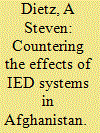

|
|
|
|
|
| Publication |
2011.
|
| Summary/Abstract |
The current approach to countering the threat of improvised explosive devices (IEDs) in Afghanistan has met with limited success. The relative lack of success may be in part because the current approach is not holistic and discounts the social systems that foster the IEDs. Insurgents are using IEDs as a tool to further their strategic aims, but the coalition and to a lesser extent the Government of the Islamic Republic of Afghanistan (GIRoA) are attacking the IEDs as if they are an end in and of themselves. Combining network disruption with information change maximizes the opportunities for mitigating the IED threat. More specifically, to mitigate the IED threat requires disrupting the social and economic systems associated with IEDs, and at the same time providing alternative economic opportunities and improving rule of law and governance at the local level. In other words, counter-IED (C-IED) must be Counter-Insurgency (COIN) centric to be successful. This paper reviews the current state of C-IED efforts, identifies five main problems with the current approach, and suggests changes to reduce or mitigate the IED threat in Afghanistan.
|
|
|
|
|
|
|
|
|
|
|
|
|
|
|
|
| 3 |
ID:
106002
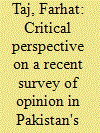

|
|
|
|
|
| Publication |
2011.
|
| Summary/Abstract |
This paper is a critically analysis of a public opinion survey recently conducted by the New America Foundation (NAF) and Terror Free Tomorrow (TFT) in the Federally Administered Tribal Area, FATA, of Pakistan on various issues pertaining to the war on terror. I argue that the survey misinforms about the tribal public opinion. To substantiate the argument I demonstrate that the survey is marred by ethical and methodological shortcomings.
|
|
|
|
|
|
|
|
|
|
|
|
|
|
|
|
| 4 |
ID:
105995


|
|
|
|
|
| Publication |
2011.
|
| Summary/Abstract |
Counterinsurgency (COIN) has again emerged as a topic of both contemporary and historical interest in the age of what has been called a global counterinsurgency. However, little attention is being paid to the historical lineage of a COIN doctrine that is being rediscovered and promoted by an enthusiastic group of military intellectuals and commanders as the basis for US Army and Marine Corps doctrine. This article argues that historical claims for COIN success, based on courting popular gratitude by improving economic conditions, are at best anchored in selective historical memory, when not fantasy fabrications. The first argument of this article is that COIN does not constitute a distinct form of warfare, but merely a sub-set of minor tactics. Second, 'hearts and minds', so-called population-centric warfare, has seldom been a recipe for lasting stability. Rather, historically counterinsurgency succeeded when it has shattered and divided societies by severely disrupting civilian life. In fact, COIN is a nineteenth century legacy of empire whose uniqueness and impact was mythologized in its own day, and that is unlikely to prove a formula for strategic success in the twenty-first century.
|
|
|
|
|
|
|
|
|
|
|
|
|
|
|
|
| 5 |
ID:
105996
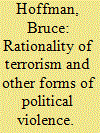

|
|
|
|
|
| Publication |
2011.
|
| Summary/Abstract |
Does terrorism work? Its targets and victims steadfastly maintain that it does not; its practitioners and apologists that it does. Scholars and analysts are divided. But, if terrorism is as ineffective as many claim, why has it persisted for at least the past two millennia and indeed become an increasingly popular means of violent political expression in the twenty-first century? Using the Jewish terrorist campaign against the British in Palestine during the 1940s, this article attempts to shed light on this question. It concludes that notwithstanding the repeated denials of governments, terrorism can, in the right conditions and with the appropriate strategy and tactics, indeed 'work'. At minimum, even if terrorism's power to dramatically change the course of history (along the lines of the 11 September 2001 attacks) has been mercifully infrequent; terrorism's ability to act as a catalyst or fulminate for either wider conflagration or systemic political change appears historically undeniable.
|
|
|
|
|
|
|
|
|
|
|
|
|
|
|
|
| 6 |
ID:
105998
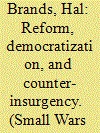

|
|
|
|
|
| Publication |
2011.
|
| Summary/Abstract |
Current debate on US counter-insurgency doctrine is dominated by the notion that promoting 'legitimacy' and 'good governance' constitutes a central strategic imperative. This idea is hardly new; during the Cold War US officials often sought to encourage democratization and socio-economic reform as antidotes to revolution in Latin America. This article reviews four such cases - Venezuela during the first half of the 1960s, Guatemala throughout the 1960s, Nicaragua during the late 1970s, and El Salvador during the 1980s. The purpose is to bring a historical perspective to bear on current debates about the feasibility of US counter-insurgency strategy by evaluating the effectiveness of previous campaigns to promote improved governance in developing societies wracked by guerrilla violence.
|
|
|
|
|
|
|
|
|
|
|
|
|
|
|
|
| 7 |
ID:
105997
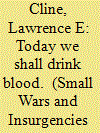

|
|
|
|
|
| Publication |
2011.
|
| Summary/Abstract |
Despite some tentative internal peace agreements, Nigeria continues to face violence from multiple groups. This violence feeds upon itself, with segments of the population being mobilized both for self defense and for pressing their ideological and practical goals. These multiple sources of violence, which the Nigerian government appears unable to control to any significant degree, have a long term corrosive effect on the country's internal stability. There are few reasons to be sanguine as to any rapid changes to the level of overall violence or the relative number of armed groups, although their specific identities may shift. Nigeria represents a good case study of a country in which relatively low but persistent violence by a multiplicity of groups can have major impacts on internal security.
|
|
|
|
|
|
|
|
|
|
|
|
|
|
|
|
| 8 |
ID:
105999


|
|
|
|
|
| Publication |
2011.
|
| Summary/Abstract |
South America has gained international media attention due to its ongoing arms race, with politicians and analysts warning about the possibility of war. Nevertheless, since the Chaco War in the 1930s, the region has seldom faced major inter-state wars, all of which have been short-lived and with relatively few casualties. This article will discuss in greater detail the ongoing arms race in South America, portraying it as a race 'of levels', with not all countries carrying out massive weaponry purchases. Finally, I will discuss regional geopolitics, geosecurity and integration as part of an analysis regarding the unlikelihood of war.
|
|
|
|
|
|
|
|
|
|
|
|
|
|
|
|
|
|
|
|
|